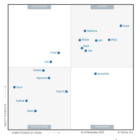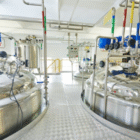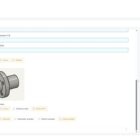In our previous article, “Applying Design Automation in the Food Industry: Fermentation Machinery Configuration Demo,” we explored the value of Design Automation in configuring specialized fermentation tanks, particularly for the dairy industry. Building upon that, we shift our focus to an even more groundbreaking development. This time, our spotlight is on a Scandinavian Digital team creation. The team’s latest product DEMO launch was a highly customizable Fermentation Tank that it can be adapted into more than 8 trillion unique versions.
This advancement represents more than just the expertise of our team, it highlights the real advantages of Design Automation. It introduces a new era of product personalization in industrial manufacturing, distinguished by improved efficiency and innovation using product knowledge digitalization.
The Scandinavian digital team’s work in creating this highly customizable product represents a paradigm shift in how complex products are designed, produced, and utilized across industries. Beyond the flexibility in production, the benefits of this innovation extend to economic, innovative, and environmental dimensions, significantly impacting a company’s bottom line, its contribution to sustainability, and its competitive stance in the marketplace.
The ability to customize meets the exact needs of different industrial applications not only enhances operational efficiency but also optimizes resource utilization. Companies can now invest in equipment that precisely matches their production requirements, reducing waste and lowering operational costs. This level of customization also opens up new markets and revenue streams, as businesses can cater to niche demands with unprecedented precision.

At the heart of this customization lies a commitment from the engineering team to work smarter, more efficiently and faster. Our team’s approach leverages Design Automation and parametrization technologies, such as Autodesk Inventor 2023 integrated with the Tacton Design Automation plug-in. This not only streamlines the customization process, reducing engineering time by up to 80%, but also lays the foundation for future innovations. By digitalizing product knowledge through master models, the team enables the rapid adaptation of designs to meet evolving customer needs, ensuring that manufacturers remain at the forefront of industry trends.

The environmental benefits of this level of customization are profound. By creating products that are precisely tailored to specific needs, manufacturers can significantly reduce the environmental footprint of their operations. This not only includes reductions in material waste and energy consumption during the production process but also extends to the entire lifecycle of the product, with optimized operation efficiencies and longer service lives.
In an extremely competitive global marketplace, the ability to offer highly customizable solutions is a clear differentiator. The Scandinavian Digital’s solutions position companies to not only meet the current demands of their customers but to anticipate future needs, creating a culture of loyalty and long-term partnership. As we have with our own customers. This strategic advantage ensures that businesses can maintain their competitive edge, adapting swiftly to changes in market dynamics and customer preferences.
To conclude our discussion, we are excited to present a comprehensive configuration video of our Fermentation Tank, which display an impressive capability of being configured in 8,334,950,400,000 unique versions.

This video takes you through a detailed step-by-step guide on customizing the model using a CAD tool, followed by a demonstration in the TACTON CPQ environment with the assistance of our innovative plug-in, CONFIG 2. This tool not only facilitates 3D visualization but also provides detailed documentation, including 2D drawings, bill of materials, and files in .glb and other formats, streamlining the configuration process and enhancing user experience.
Our highly customizable Fermentation Tank is ideal for several key industries, including pharmaceuticals, biotechnology, food and beverage, and chemical manufacturing. These sectors can greatly benefit from implementing Design Automation, efficiency, and adaptability, enhancing product quality, process optimization, and sustainability. Moreover, its utility extends to cosmetics, agricultural products, environmental management, and renewable energy sectors, underscoring its broad applicability and potential.




